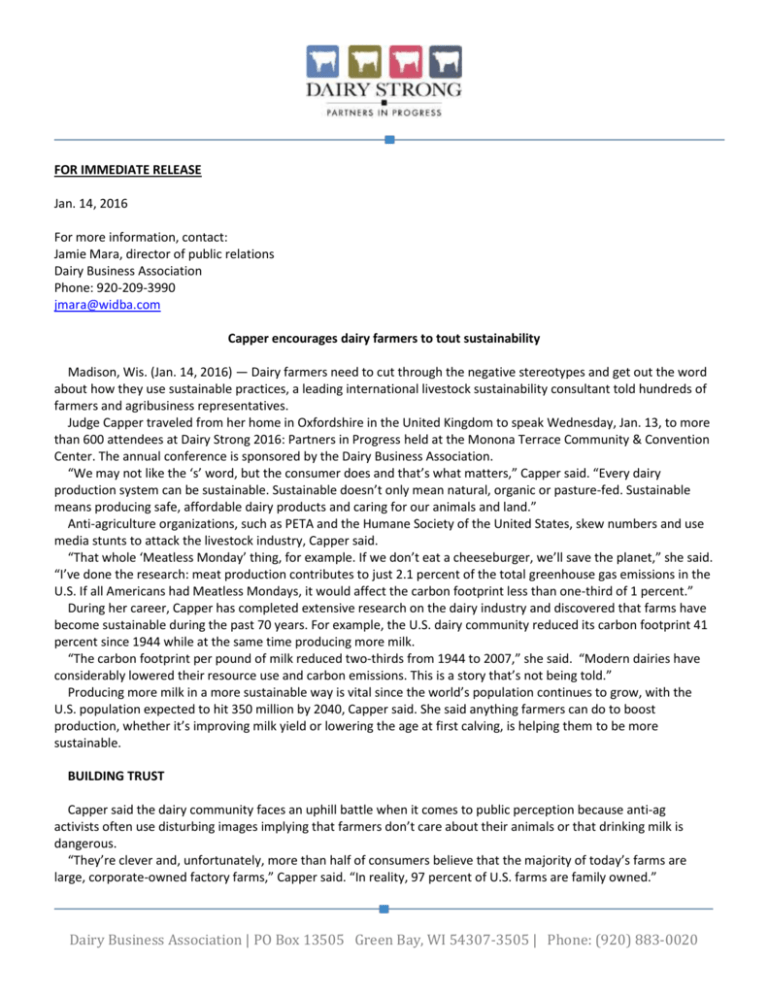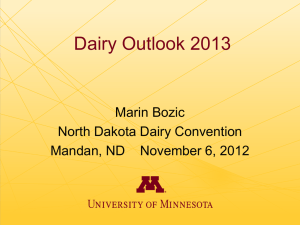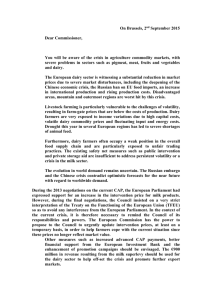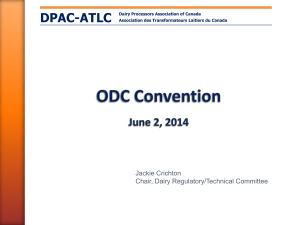the full release
advertisement

FOR IMMEDIATE RELEASE Jan. 14, 2016 For more information, contact: Jamie Mara, director of public relations Dairy Business Association Phone: 920-209-3990 jmara@widba.com Capper encourages dairy farmers to tout sustainability Madison, Wis. (Jan. 14, 2016) — Dairy farmers need to cut through the negative stereotypes and get out the word about how they use sustainable practices, a leading international livestock sustainability consultant told hundreds of farmers and agribusiness representatives. Judge Capper traveled from her home in Oxfordshire in the United Kingdom to speak Wednesday, Jan. 13, to more than 600 attendees at Dairy Strong 2016: Partners in Progress held at the Monona Terrace Community & Convention Center. The annual conference is sponsored by the Dairy Business Association. “We may not like the ‘s’ word, but the consumer does and that’s what matters,” Capper said. “Every dairy production system can be sustainable. Sustainable doesn’t only mean natural, organic or pasture-fed. Sustainable means producing safe, affordable dairy products and caring for our animals and land.” Anti-agriculture organizations, such as PETA and the Humane Society of the United States, skew numbers and use media stunts to attack the livestock industry, Capper said. “That whole ‘Meatless Monday’ thing, for example. If we don’t eat a cheeseburger, we’ll save the planet,” she said. “I’ve done the research: meat production contributes to just 2.1 percent of the total greenhouse gas emissions in the U.S. If all Americans had Meatless Mondays, it would affect the carbon footprint less than one-third of 1 percent.” During her career, Capper has completed extensive research on the dairy industry and discovered that farms have become sustainable during the past 70 years. For example, the U.S. dairy community reduced its carbon footprint 41 percent since 1944 while at the same time producing more milk. “The carbon footprint per pound of milk reduced two-thirds from 1944 to 2007,” she said. “Modern dairies have considerably lowered their resource use and carbon emissions. This is a story that’s not being told.” Producing more milk in a more sustainable way is vital since the world’s population continues to grow, with the U.S. population expected to hit 350 million by 2040, Capper said. She said anything farmers can do to boost production, whether it’s improving milk yield or lowering the age at first calving, is helping them to be more sustainable. BUILDING TRUST Capper said the dairy community faces an uphill battle when it comes to public perception because anti-ag activists often use disturbing images implying that farmers don’t care about their animals or that drinking milk is dangerous. “They’re clever and, unfortunately, more than half of consumers believe that the majority of today’s farms are large, corporate-owned factory farms,” Capper said. “In reality, 97 percent of U.S. farms are family owned.” Dairy Business Association | PO Box 13505 Green Bay, WI 54307-3505 | Phone: (920) 883-0020 Getting consumers to visit farms and learn more about how animals are cared for is a start, but “it’s not a silver bullet,” Capper said. “Only 19 percent of visitors and 22 percent of moms feel better about food production after visiting a farm.” Capper suggests that farmers and those in the ag industry keep on telling their family members and friends about what they do every day. When it comes to who consumers find most trustworthy about food issues, friends and family top the list at 66 percent, she said. Farmers and ranchers are trusted by 53 percent of the population. “We shouldn’t waste our time on activists. We won’t change their minds,” Capper said. “We also don’t need to focus on our true believers. We need to focus on the people in the middle who are looking for answers. We need to reach out to them.” Capper, who has an active presence on social media and is on Twitter at @bovidiva, said using platforms such as Twitter, Facebook, Instagram and others is one way to start. “We need to keep spreading more positive messages and images about the dairy industry,” she said. “We need to engage consumers and let them know we’re here to provide safe, nutritious dairy products in a sustainable matter while taking good care of our animals.” ABOUT DBA: The Dairy Business Association is an industry organization comprised of dairy producers, corporate as well as allied industry supporters. DBA promotes the growth and success of all dairy farms in Wisconsin by fostering a positive business and political environment. For more information about DBA, please visit our website at www.widba.com. # # # Dairy Business Association | PO Box 13505 Green Bay, WI 54307-3505 | Phone: (920) 883-0020




